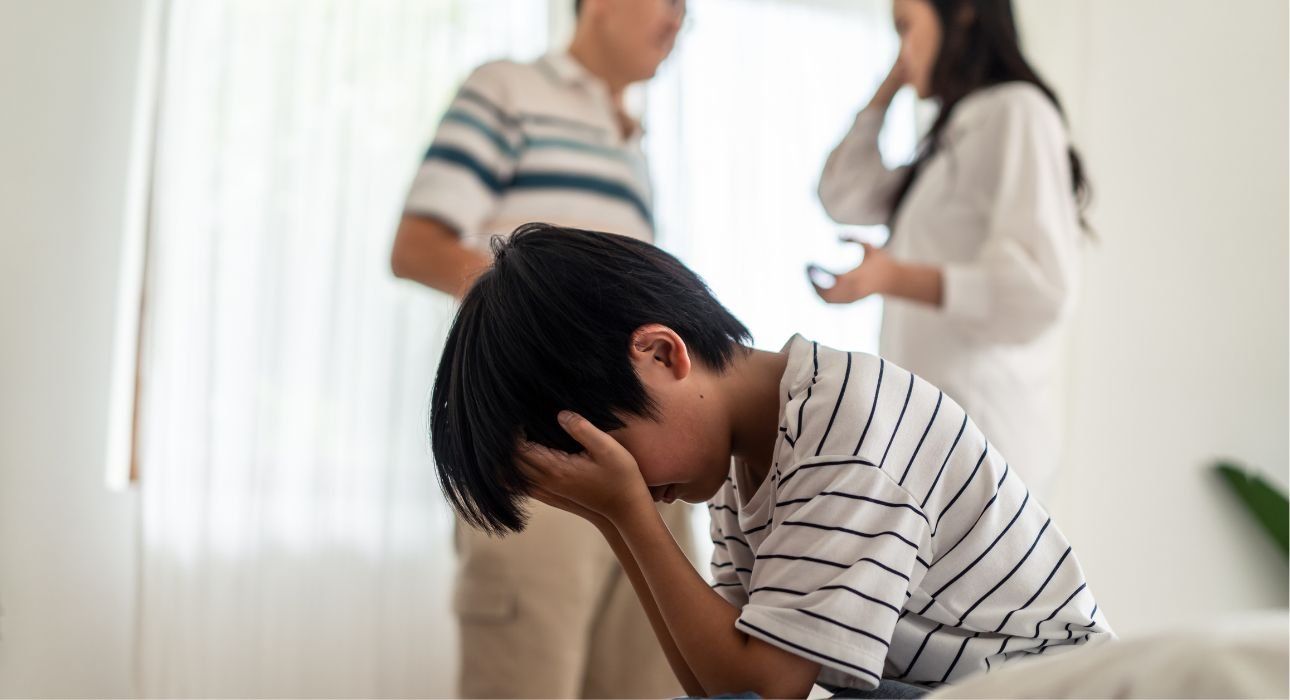Prolonged and acute parental conflict can be devastating psychologically to children. When there is fighting between parents, they are at risk of depression, anxiety, behavioural disorders, and poor social relationships. The children can be insecure or believed to have caused the conflict. Inappropriate coping mechanisms include withdrawing and being aggressive. Consistently witnessing arguments between parents could impact a child’s emotional control and lead to future mental issues.
For example, the Children of Marital Conflict Study (Cummings, Goeke-Morey, & Papp, 2004) followed families over several years and found that children who frequently observed intense parental arguments—especially those involving shouting or threats—showed higher levels of anxiety and aggression both at home and in school. One case described a young girl who began developing nightmares and avoided inviting friends home after witnessing repeated conflicts between her parents.
However, once her parents learned conflict-resolution skills through therapy and modelled calm discussion, her emotional distress significantly decreased. Parents who solve problems amicably and convey affection and emotional availability to their little ones can help diminish the effects. The child is then able to acquire positive communication skills.
Read More: The Psychology of Emotional Triangulation: How Family Conflict Causes Stress
Emotional and Behavioural Consequences
Seeing the parents quarrel can have a great negative impact on the emotional and behavioural well-being of a child.
- Fear and instrumental insecurity: Young children exposed to frequent parental quarrels have an increased chance of developing anxiety and fear as well as emotional insecurity. They also tend to take the blame for the conflict, though they are not involved and may be afraid of being left alone. This phobia might result in continued stress. The abnormal emotions may also cause anxiety, panic, and emotional instability, and they may be unable to be psychologically stable.
- Sleep Issues
Children could experience problems with sleep, including insomnia, nightmares, and restless nights, because of the stress of being a witness to fights. It has been found that emotional insecurity due to parental fights may directly cause the two sleep problems, which may hamper their cognitive and emotional processes.
- Difficulty Focusing on Studies and Making Cognitive Decline: The continuing worries of a child of family hassle may diminish a child’s focus, educational capacity, and interest in education. Their memory capacity to retain new information and problem-solving skills may deteriorate, resulting in poor performance in school. This decline in school performance is not simply behavioural, but is the result of stress.
- Behavioural Problems: Children may show their distress by being violent, rebellious, or withdrawn. Others might imitate the combat nature that they observe, and some might seclude and isolate themselves, which leads to loss of self-esteem and isolation.
Influence on Relationships and Attachment
Children raised in homes with a lot of conflict are likely to have insecure attachment, which has a bad impact on their trust, relations and feelings as adults.
1. Insecure Attachment Styles
Frequent quarrelling between parents destroys the feeling of safety in a child and predisposes him/her to form insecure attachment styles such as avoiding, anxious, and disorganised. Children will lack the capacity to trust when they are unable to look at their caregivers as a source of comfort. This complicates the development of healthy relationships in them and may result in emotional dysregulation.
Read More: How Does a Child Develop Attachment Style?
2. Loss of Security and Trust
Any unresolved conflicts may also damage the relationship between parent and child, as well as undermine emotional support. Children can perceive conflict as something ordinary and become too sensitive and fearful of being left. The lack of assessment of their parents does not allow them to use their parents as a safe place to find emotional solace.
3. Conflicts in Relationships in the Future
It is these difficult situations that influence the way the child views relationships. A child brought up in a high-conflict environment by weak caregivers can develop a negative attitude to intimacy, have problems with trust, and be unable to solve conflicts. This may result in overdependency or shunning of future romantic relationships following the patterns they saw.
Read More: How Conflicts in our Relationships can lead to Self-Awareness
4. Maladaptive Coping Strategy
To react to distress, children can either become avoidant, aggressive or withdrawn. It is not healthy to avoid emotional pain, as it offers temporary protection, which is not good when it comes to social development. Such a behaviour exposes them to anxiety, depression and unstable relationships in their adulthood.
Long-term Cognitive and Social Development
Excessive experiences of conflict involving parents may have serious negative consequences on the cognitive functioning of the child, social adequacy, and emotional stability, as well as on their quality of life in adulthood.
1. Problem-Solving and Self-Esteem Impairments
Prolonged exposure to parental conflicts may seriously impair cognitive abilities needed to solve problems and emotional control. Unhealthy conflict resolution methods may be taught to the children, and those approaches hinder coping with difficulties. A home environment of conflict has been found to cause low self-esteem since most children tend to internalise the aggression and blame it on themselves, thus causing adverse self-perceptions that may extend into adulthood.
Read More: Mastering Your Emotions: A Guide to Emotional Control
2. Reduced Social Competence
These children usually have difficulties in trusting some people, communicating, and maintaining healthy relationships. They can be socially anxious, withdrawn or aggressive, a factor that will impede peer relations. Exposing them to the bad conflict behaviour, they can acquire bad relationship qualities that will affect their social behaviour and social relations with others.
3. Risks of Externalising and Internalising Disorders
Children with a history of life stress at home due to continuous conflicts are more likely to develop internalising and externalising disorders, such as depression and defiance, and outbursts of anger, respectively. Unresolved and escalated conflicts can also increase the likelihood of children developing mental conditions like Complex PTSD, as it results from chronic exposure to discord between caregivers.
Conclusion
The disagreement between parents has significant effects on a child’s mental health, affecting emotional security and thus attachment and self-regard. It can also initiate anxiety, alongside cognitive and behavioural difficulties, which then affect the child in social and academic areas. Children in this environment are at greater risk of developing internalising and externalising disorders. The provision of the right type of emotional support and conflict resolution can help lessen the effects of conflict and promote the development of healthy psychological attributes.
FAQs
1. Can children develop behavioural problems because of parental conflicts?
Yes. Children witnessing persistent quarrels may display aggression, defiance, or withdrawal. Some imitate the hostile behaviour they see at home, while others isolate themselves due to fear or guilt (Grych, Seid, & Fincham, 1992).
2. What happens to children’s academic performance when parents fight frequently?
Chronic stress from family tension affects concentration, memory, and motivation. These children often perform poorly in school because their cognitive resources are directed toward coping with emotional stress rather than learning (Davies & Cummings, 1994).
3. Can parental fights cause sleep disturbances in children?
Yes. Emotional insecurity and stress resulting from conflicts can lead to insomnia, nightmares, or frequent awakenings at night. Such sleep issues negatively impact emotional balance and cognitive functioning (Hess, 2022).
4. How do parental fights influence attachment styles in children?
Children raised in high-conflict homes often develop insecure attachment styles—avoidant, anxious, or disorganised. They may find it difficult to trust others and struggle to form stable relationships as adults (McCoy, Cummings, & Davies, 2009).
5. Are the effects of parental conflicts long-lasting?
Absolutely. Early exposure to unresolved conflict can shape a person’s emotional responses and relationship patterns well into adulthood, increasing risks for depression, anxiety, or even post-traumatic stress symptoms (Sturge-Apple, Skibo, & Davies, 2012).
6. Can conflict between parents ever have a positive outcome for children?
If handled constructively—where parents resolve disagreements respectfully and show mutual understanding—it can teach children problem-solving and communication skills. This approach demonstrates healthy emotional regulation (Harold & Sellers, 2018).
References +
Davies, P. T., & Cummings, E. M. (1994). Children’s representations of interparental and parent–child relationships as mediators of the impact of marital conflict on child adjustment. (Cited in: Interparental Conflict and Children’s School Adjustment) (PMC)
Du Rocher Schudlich, T., & Cummings, E. M. (2011). The implications of early marital conflict for children’s development. Journal of Family Psychology, 25(5), 683–692. (PMC)
Grych, J. H., Seid, M., & Fincham, F. D. (1992). Assessing marital conflict from the child’s perspective: The Children’s Perception of Interparental Conflict Scale. Child Development, 63(3), 558–572. (As referenced in research on interparental conflict) (Taylor & Francis Online)
Harold, G. T., & Sellers, R. (2018). Annual research review: Interparental conflict and youth psychopathology: An evidence review and practice-focused update. Journal of Child Psychology and Psychiatry, 59(4), 374–392. (Summary of associations between conflict and internalising/externalising disorders) (Taylor & Francis Online)
Hess, S. (2022). Effects of inter-parental conflict on children’s social well-being and the mediation role of parenting behaviour. Applied Research in Quality of Life, 17(8), 2059–2085. (SpringerLink)
McCoy, K., Cummings, E. M., & Davies, P. T. (2009). Constructive and destructive marital conflict, parent–child relations, and child adjustment. (As discussed in the differential effects of conflict) (PMC)
Sturge-Apple, M. L., Skibo, M. A., & Davies, P. T. (2012). Impact of parental conflict and emotional abuse on children and families: A review of empirical research. Partner Abuse, 3(3). (domesticviolenceresearch.org)
Physiological responses during parental conflicts as potential mechanisms: Adolescents’ internalising and externalising problems. Children, 10(7). (On modulation of anxiety, depression, and conflict appraisal) (MDPI)
“Parental conflict and its effect on children.” (n.d.). Family & Children First Community of Australia. (Summary of emotional, social, behavioural, and academic impacts) (Federal Circuit Court)
“Influence of Parent–Child Conflict on Psychological Distress among Adolescents.” (n.d.). PMC. (On parent–child conflict as mediator between parental conflict and adolescent distress) (PMC)













Leave feedback about this